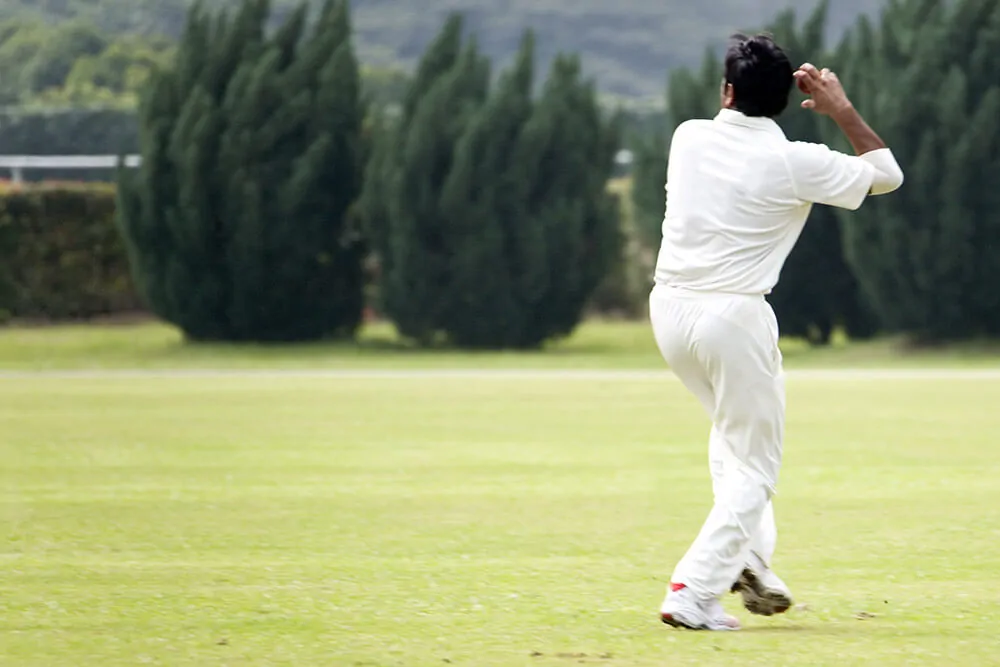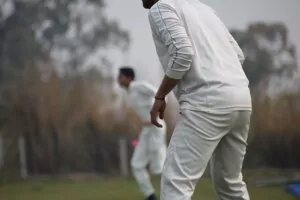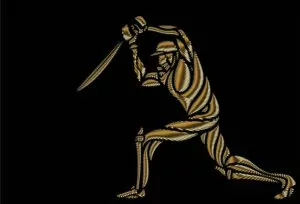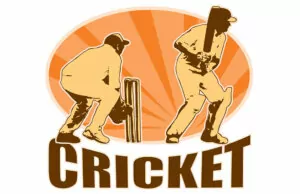Most Wickets in a Single Test Match

Test matches are won by bowling out the opposition twice. Thus, wicket-taking bowlers are worth their weight in gold. Batsmen may set the Test matches but it’s the bowlers who win it for their teams.
In this article, we are going to talk about 12 players taking a minimum of 15 wickets in a single Test match. Of the 12 players, 7 belong to England, 2 belong to India and 1 each belongs to Australia, New Zealand and Sri Lanka. The performances on the list vary from the late 18th-century England bowlers such as Johnny Briggs and George Lohmann playing against South Africa to the early 21st-century performance from Harbhajan Singh from India.
Let’s start with world record holder Jim Laker with his 19 wickets against Australia taken in 1956. That record of 19 wickets in a single Test match is still unbeaten after 64 years.
Contents
- 19. Wickets – Jim Laker (ENG)
- 17. Wickets – Sydney Barnes (ENG)
- 16. Wickets – Narendra Hirwani (IND)
- 16. Wickets – Bob Massie (AUS)
- 16. Wickets – Muttiah Muralitharan (SL)
- 15. Wickets – Johnny Briggs (ENG)
- 15. Wickets – George Lohmann (ENG)
- 15. Wickets – Colin Blythe (ENG)
- 15. Wickets – Hedley Verity (ENG)
- 15. Wickets – Sir Richard Hadlee (NZ)
- 15. Wickets – Wilfred Rhodes (ENG)
- 15. Wickets – Harbhajan Singh (IND)
19. Wickets – Jim Laker (ENG)
Jim Laker made a mark on the history of Test cricket when he took 19 wickets for 90 runs against Australia with an average of 4.73 and an economy of 1.32. With that, Laker became the first bowler in Test cricket to pick up 10 wickets in an innings. The match was played at the Old Trafford, Manchester in July 1956.
Contents
- 19. Wickets – Jim Laker (ENG)
- 17. Wickets – Sydney Barnes (ENG)
- 16. Wickets – Narendra Hirwani (IND)
- 16. Wickets – Bob Massie (AUS)
- 16. Wickets – Muttiah Muralitharan (SL)
- 15. Wickets – Johnny Briggs (ENG)
- 15. Wickets – George Lohmann (ENG)
- 15. Wickets – Colin Blythe (ENG)
- 15. Wickets – Hedley Verity (ENG)
- 15. Wickets – Sir Richard Hadlee (NZ)
- 15. Wickets – Wilfred Rhodes (ENG)
- 15. Wickets – Harbhajan Singh (IND)
Winning the toss, England batted first and scored 459 in the first innings thanks to centuries from Peter Richardson and David Sheppard at the top of the order. Jim laker, then, ran through Australia’s first innings picking up 9 wickets for just 37 runs in 16.4 overs. Jim Burke was the only wicket that went to Tony Lock. The remaining were captured by Laker. Australia were made to follow on, and this time, Laker did not leave a single wicket for anyone else, picking up all 10 wickets for 53 runs in 51.2 overs. England won the match by innings and 170 runs.
17. Wickets – Sydney Barnes 17. Wickets – Sydney Barnes (ENG)
ly short Test Career but he regularly wreaked havoc in the opposition batting camp. The second-best performance in Test cricket of 17 wickets for 159 runs came from him against Australia with about 9.35 runs per wicket and an economy of 2.42.
The match took place in Johannesburg, South Africa way back in December 1913. In South Africa’s first innings, Sydney Barnes ran through the batting lineup to take 8 wickets for 56 runs. In the second innings, he went one better to take 9 wickets for 103 runs in 38.4 overs. England didn’t have to bat again as they won the match by an innings and 12 runs.
16. Wickets – Narendra Hirwani (IND)16. Wickets – Narendra Hirwani (IND)
f just 17 Tests but in that short period, he registered the best figures achieved by an Indian bowler in Test cricket. In his debut Test match in Chennai in 1988 against theWest Indies, Hirwani took 16 wickets for 136 runs at an average of 8.5 and an economy of 4 an over.
Batting first, India put on 382 on the board. In the West Indies’ first innings, Ravi Shastri and Kapil Dev removed the openers with 47 runs on board. Hirwani then came on to bowl and took all the remaining 8 wickets for 61 runs in 18.3 overs as the guests folded for 184 runs. India batted again and set a target of 416 runs. It proved too much in front of Hirwani as he took another 8-wicket haul to skittle out the Windies for just 160 and to complete a comprehensive win for India by 255 runs.
16. Wickets – Bob Massie (AUS)
A
16. Wickets – Bob Massie (AUS)
2, took 16 wickets for 137 runs for Australia against England with an average of 8.56 and an economy rate of 2.27. The match was held at Lord’s in June 1972.In England’s first innings, Bob Massie took 8 wickets for 84 runs in 32.5 overs. Australia scored 308 in their first innings. Bob Massie, on debut, improved his first innings performance to take 8 wickets for 53 runs in 27.2 overs in England’s second innings. Australia eventually won the match by 8 wickets, chasing a target of just 81 runs.
16. Wickets – Muttiah Muralitharan (SL)
Mu
16. Wickets – Muttiah Muralitharan (SL)
Test cricket with 800 wickets to his name, took 16 for 220 against England at The Oval in August 1998. The wickets came at an average of 42.6 and an economy of 1.93 in 113.5 overs across innings.England batted well in the first innings to score 445 all-out but 7 of those wickets went to Muralitharan for 155 runs. Sri Lanka responded with 591. In England second innings Muralitharan single-handedly demolished England for 181 by taking 9 for 65 in 54.2 overs. Sri Lanka won the match by 10 wickets chasing just 36 runs in the fourth innings.
15. Wickets – Johnny Briggs (ENG)
Johnny Brigg
15. Wickets – Johnny Briggs (ENG)
just 28 runs against South Africa at Cape Town way back in March 1889 with an average of 1.86 and an economy of 1.24. This was South Africa’s second Test match in the first-ever Test Series.England reached 292, batting first in Cape Town. South Africa folded for 47 as Johnny Briggs bagged 7 wickets for 17 runs in 19.1 overs. Following on, South Africa were demolished for even a lower score of 43 with the help of Briggs’s 8 wickets for 11 runs in 14.2 overs. Briggs achieved the lowest average and strike rate among the bowlers on this list. England won the match by an innings and 202 runs.
15. Wickets – George Lohmann (ENG)
George Lehman was a
15. Wickets – George Lohmann (ENG)
est match in the 18th century. He took 15 for 45 runs at an average of 3 and an economy of 2.10 against South Africa in Port Elizabeth in February 1896.England, after bundling out for 185 in their first innings, skittled out inexperienced South Africa for 93 runs in their first innings with the help of George Lohmann who took 7 wickets for 38 runs in 15.4 overs. Scoring 226 in their second innings, England set a target of 319 for South Africa. However, Lohmann’s burst of 8 wickets for just 7 runs in 9.4 overs embarrassed South Africa as the host folded for a meager 30 runs, losing the Test by 288 runs.
15. Wickets – Colin Blythe (ENG)
Colin Blythe took 115. Wickets – Colin Blythe (ENG)
ly 20th century against South Africa in Leeds in July 1907. He took those wickets at an average of 6.6 and an economy of 2.57.
England scored just 76 in their first innings. England needed someone to restrict South Africa. In came Colin Blythe to take 8 wickets for 59 runs in 15.5 overs to restrict South Africa to 110. England managed 162 in the second innings and set a target of 129 for SA. However, Blythe took another 7 wickets for 40 to restrict SA to 75 in their second innings, thus, winning the match by 53 runs for England.
15. Wickets – Hedley Verity (ENG)
Hedley Verity took 15 15. Wickets – Hedley Verity (ENG)
’s for England against Australia in June 1934. He averaged 6.93 at an economy of 1.77 in that innings.
Batting first, England made 440. Australia managed 284 in the first innings but could not avoid follow-on thanks to Verity who took 7 for 61 runs. Following on, Australia could manage just 118 again due to Verity who picked up 8 for 43 runs to help England win the match by an innings and 38 runs.
15. Wickets – Sir Richard Hadlee (NZ)
Sir Richard Hadlee took 15. Wickets – Sir Richard Hadlee (NZ)
ge of 8.20 and an economy of 2.34 against Australia in Brisbane in November 1985.
Hadlee almost took out the entire Australian team in the first innings with 9 wickets for 52 runs as the Aussies managed 179. New Zealand declared for 557 for 7 in their first innings. Aussies did well but still not enough in the second innings as they were out for 333 thanks to 6 wickets for 71 runs by sir Richard Hadlee. New Zealand won by an innings and 41 runs.
15. Wickets – Wilfred Rhodes (ENG)
Wilfred Rhodes took 15 wickets 15. Wickets – Wilfred Rhodes (ENG)
ric-life.com/melbourne-renegades-vs-hobart-hurricanes-bbl-10-match-55-preview/" target="_blank" rel="noopener noreferrer">Melbourne in January 1904 for 124 runs at an average of 8.26 and an economy of 4.08.
England batted first to score 315 in the first innings. Wilfred Rhodes took 7 wickets for 56 runs to restrict Australia to 122 in their first innings. England set a target for 297 for Australia to win but Rhodes took another 8 wickets for 68 runs to help England win the match by 185 runs.
15. Wickets – Harbhajan Singh (IND)
Harbhajan Singh took 15 wickets fo15. Wickets – Harbhajan Singh (IND)
rong>against Australia in Chennai in March 2001. The Test was played just after the iconic Test match in Kolkata in 2001.
Australia batted first to score a formidable 391 with Harbhajan taking 7 for 133 runs. India responded well by scoring 501. In Australia’s second innings Harbhajan took 8 for 84 as the guests folded for 264 runs. India reached the 155-run target with two wickets to spare.
| Bowler | Figures (O-M-R-W) |
1st inns | 2nd inns | Against | Year |
| Jim Laker (Eng) | 68-27-90-19 | 9/37 | 10/53 | Australia | 1956 |
| S Barnes (Eng) | 65.3-16-159-17 | 8/56 | 9/103 | South Africa | 1913 |
| N Hirwani (Ind) | 33.5-6-136-16 | 8/61 | 8/75 | West Indies | 1988 |
| B Massie (Aus) | 60.1-16-137-16 | 8/84 | 8/53 | England | 1972 |
| Muralitharan (SL) | 113.5-41-220-16 | 7/155 | 9/65 | England | 1998 |
| J Briggs (Eng) | 33.3-16-28-15 | 7/17 | 8/11 | South Africa | 1889 |
| G Lohmann (Eng) | 25.2-11-45-15 | 7/38 | 8/7 | South Africa | 1896 |
| C Blythe (Eng) | 38.3-10-99-15 | 8/59 | 7/40 | South Africa | 1907 |
| H Verity (Eng) | 58.3-23-104-15 | 7/61 | 8/43 | Australia | 1934 |
| R Hadlee (NZ) | 52.3-13-123-15 | 9/52 | 6/71 | Australia | 1985 |
Glossary: Inns-Innings; M-Maidens, O-Overs, R-Runs, W-Wickets.






